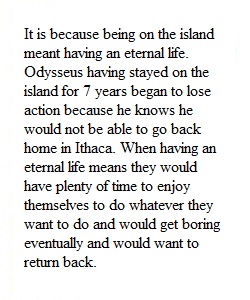


Q Film Response: O Brother Where Art Thou? • Points 20 • Submitting a text entry box or a file upload This Film Response Journal is based on your readings from SECTION II: THE HUMAN BEING AND THE LIFE CYCLE Chapter 7: Why Not Immortality? the Odyssey of Homer (Odysseus and Kalypso) and SECTION III: LIVING WELL Chapter 9: Living Immediately The Odyssey of Homer (The Lotus Eaters) Music by Steely Dan inspired by The Odyssey. (Links to an external site.) The film O Brother Where Art Thou? (Links to an external site.) (Links to an external site.) 1. While Odysseus fears that he is trapped on Kalypso's island forever, he can take no pleasure in the nymph, but "would lie beside her of necessity." Once he learns that he is leaving, the two "enjoy themselves in love." Why does desire fade at the prospect of eternity? 2. Why does Odysseus choose a life of struggle over ease, life with an aging woman over life with an eternally youthful nymph, and mortal life at home instead of eternal life in paradise? In short, why does he choose to die? Would you make the same choice? 3. Why are "men" characterized as "eaters of bread?" What does it mean to be eaters of flowers, instead? What can one assume about a people that eat bread? Or, more generally, to what extent does what we eat convey who we are? 4. The Lotus-Eaters had no "thoughts of destroying" Odysseus's men, "but they only gave them lotus to taste of." And yet, Odysseus acts as if their destruction was imminent. Is he right? What does it mean to "forget the way home?" Might such forgetting be tantamount to destruction? In general, is forgetting -- memory loss -- tantamount to destruction? 5. Eaters of lotus live entirely and seemingly blissfully in the moment. Though they are living in the present, can they be said to be of the present? Can they be said to be living? Are they still themselves? Are they really happy? 6. O Brother, Where Art Thou? (2000), by Joel and Ethan Coen, is a loose adaptation of The Odyssey. The Coens updated Homer’s Trojan War epic to Depression-era Mississippi, circa 1937. What similarities do you see between the story and the film?
View Related Questions